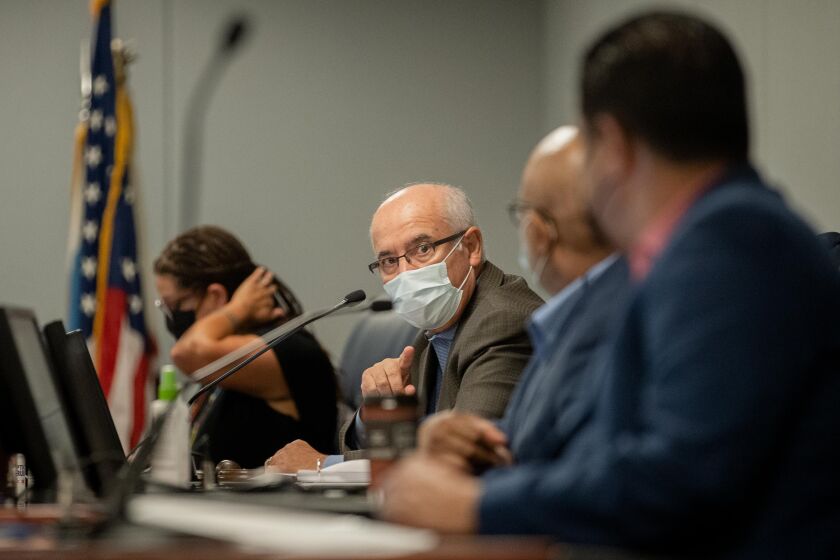As Chicago’s Board of Education voted to renew its agreement with the Chicago Police Department to the tune of $11.1 million Wednesday, a committee of community groups that has worked to reform the school police program said it was pleased with the district’s progress to this point.
The measure to approve a one-year extension of the contract that puts uniformed police officers in about half of the city’s public high schools passed by a 4-2 vote, with the two board members who have been most strongly critical of the police presence in schools continuing to voice their opposition because of the disproportionate policing of Black students.
Yet the community groups’ message — and those two board members’ appreciation of the changes that have been made over the past few months — was a stark departure from this time last year, when students and police-free school advocates marched through the city and protested outside the downtown Chicago Public Schools headquarters to call for all cops to be removed from the few dozen high schools to which they were assigned.
While those activists haven’t been as vocal the past year, they have still worked to transform the district’s vision for school safety. That resulted in a process through which dozens of schools developed plans to provide alternate student supports that would create both physically and emotionally safe environments with or without police. A handful of schools voted to remove a total of 42 cops from their buildings, and CPS in turn has provided funding for those schools to implement new safety plans.
“The shift of more than $3.2 million from the school resource officer program into restorative justice and other holistic approaches to school safety is a welcome policy change that we believe will improve the educational environment for Chicago Public School students,” read a statement from the committee of five advocate groups — VOYCE, The ARK of St. Sabina, Build Inc., COFI and Mikva Challenge.
“Our goal is to fully transform school environments that center the emotional, physical and mental-health needs of students, especially students of color. That will include developing school-wide strategies to address the disparities in police notifications and school safety and applying lessons learned to develop system-wide strategies and tools to fully transform school safety across CPS.”
Even with that reduction of police presence in schools, however, this year’s contract is only about $1 million cheaper than last year’s — which CPS didn’t end up paying since schools were closed the majority of the year and officers didn’t return to schools when they opened.
CPS’ safety and security chief Jadine Chou said Wednesday that the minimal reduction in cost was partly due to officers’ raises in the new Fraternal Order of Police contract, but more significantly because last year’s agreement was signed with the knowledge that all classes would be remote for at least the first quarter of the school year. The addition of about 40 in-person days this year boosted the cost, essentially offsetting most of the savings that came with fewer officers.
The district also had already cut its police expenses from $33 million two years ago to about $12 million last year.
Chou said she remains committed to eliminating criminal records for students based on in-school behavior being met with policing.
“We completely agree that we have to not only get to a zero school-to-prison pipeline, but we also have to understand what’s behind the disproportionality,” she said. “And it’s not just high schools, which have [school officers]. This is a problem that we have across schools. And so even elementary schools that don’t have [in-school officers], we’re seeing challenges.”
Elizabeth Todd-Breland, the most vocal board member on the issue of school policing, thanked Chou and the groups that have worked to address concerns over the past year. But she said she would vote against the contract because of the continued disproportionate policing of Black students and those in special education.
“While I understand the belief that this decision should happen at the school level, the global impact of that, for me, is something that resides at the board level,” she said.
Lightfoot and former CPS CEO Janice Jackson were adamant last year that they wouldn’t issue a blanket removal of officers, and each school should make its own decision.
Luisiana Melendez, the other board member to reject the agreement, said she also respected the process the district had created for schools to reconsider involvement in the program, but “as someone who is a child development expert, I am very much aware of the negative impact of school officers on students, and particularly students of color.”
The new agreement will be the first overseen by incoming CEO Pedro Martinez. Asked last we week at his introductory news conference for his thoughts on school police, Martinez said he didn’t think cops should ever be used in school discipline, but he added that he believes officers can provide a level of safety for schools.
Martinez then indicated he could be interested in looking at the possibility of CPS creating its own police force, separate from CPD.
“Most districts in the country have their own police forces where they can train them in a certain way on how to work with our children,” he said. “We sort of have a little bit of a hybrid here, and so that’s something that I just want to explore with our police chief, with the mayor, and really try to see what’s the best solution for our schools.
“But like I said, my commitment is, I need to make sure we’re meeting the needs of parents, and parents want schools to be safe.”





